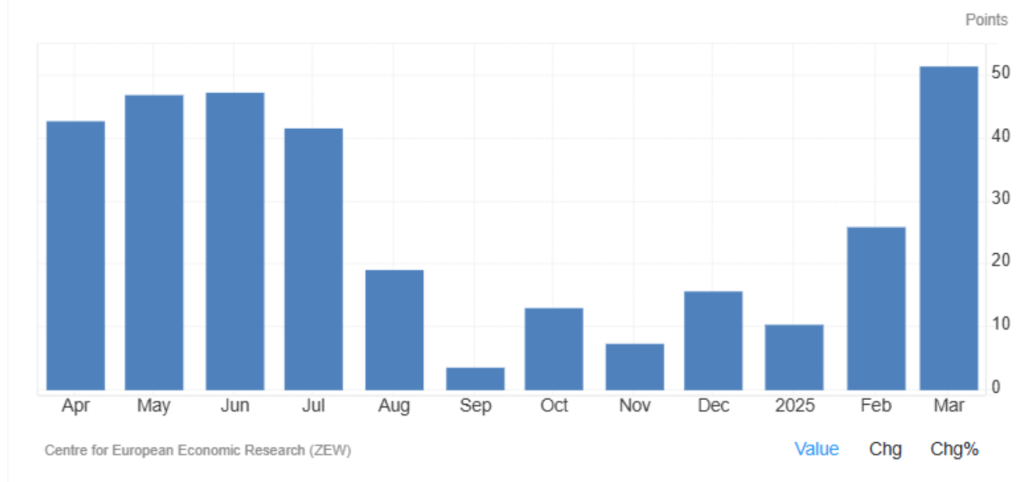
Germany’s ZEW Economic Sentiment Index Soars
The ZEW Economic Sentiment Index in Germany surged to 51.6 in March 2025, reaching its highest level since February 2022. This significant leap from 26 in the previous month not only signals growing confidence in the German economy but also exceeded market expectations of 48.1. But what’s behind this impressive recovery? And what does it mean for the financial markets? Let’s dive deeper.
ZEW Index: A Key Indicator of Market Confidence
What is the ZEW Economic Sentiment Index?
The ZEW Index is a widely followed economic indicator that measures the expectations of financial experts regarding Germany’s economic outlook. Conducted by the ZEW Institute, it reflects investor sentiment and can serve as a leading indicator for market trends.
Why Does the ZEW Index Matter?
A strong ZEW Index suggests optimism about future economic growth, while a decline may indicate potential slowdowns. This indicator is crucial because it predicts economic trends based on expert sentiment, influences financial markets by impacting stocks and currency movements, and affects monetary policy as central banks consider sentiment data when making rate decisions.
What’s Driving the ZEW Index Surge?
German Government’s Fiscal Boost
The approval of a multi-billion euro stimulus package for the federal budget has played a crucial role in boosting confidence. By injecting liquidity into the economy, the government aims to drive investment and stabilize financial markets.
Recovery in Key Industrial Sectors
Sectors like metal production, machinery, and steel manufacturing have shown signs of recovery. This industrial rebound suggests that Germany’s manufacturing sector—one of the pillars of its economy—is on a path to revival.
Read More: Germany’s Manufacturing PMI Shows Minor Improvement
ECB’s Supportive Monetary Policy
The European Central Bank (ECB) has implemented its sixth consecutive interest rate cut, easing borrowing costs for businesses and consumers. Lower interest rates have helped improve liquidity, driving economic activity and investor confidence.
Reduced Pessimism About Current Conditions
While overall economic conditions remain challenging, the Current Economic Conditions Index slightly improved from -88.5 in February to -87.6 in March. This suggests that while structural issues persist, there is a shift towards a more optimistic outlook.

How Will This Impact the Markets?
Strengthening of the Euro
A stronger ZEW Index often boosts the euro as investor confidence in the German economy increases. We could see the EUR gaining ground against major currencies in the forex markets.
Positive Sentiment in the Stock Market
With improved economic sentiment, Germany’s stock market is likely to react positively. Industries such as metals, machinery, and steel could see increased investor interest.
Support for Economic Growth
The combination of fiscal stimulus and accommodative ECB policies could help steer Germany away from prolonged stagnation, providing relief to businesses and consumers.
Challenges That Still Remain
Despite the surge in sentiment, Germany’s economy is not out of the woods yet. Key challenges include structural weaknesses, as the current conditions index remains deeply negative (-87.6), highlighting ongoing economic struggles. Additionally, global market risks such as trade tensions, energy price volatility, and geopolitical uncertainties continue to pose risks.
Final Thoughts
The sharp rise in the ZEW Economic Sentiment Index marks a turning point for investor confidence in Germany. With government stimulus, an industrial recovery, and ECB support, there is reason for cautious optimism. However, persistent economic weaknesses and global uncertainties mean the road to full recovery is still uncertain. Investors and policymakers alike will be watching closely to see if this optimism translates into sustained economic growth.
Share
Hot topics

Best broker for gold trading
There’s always been a certain magic about gold. Before online charts and trading applications, people stored their wealth in coins and bars, trusting that gold would retain its value during...
Read more




Submit comment
Your email address will not be published. Required fields are marked *